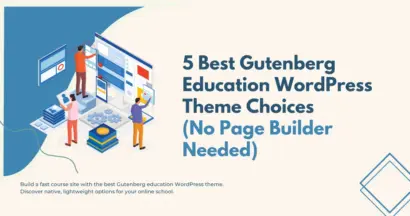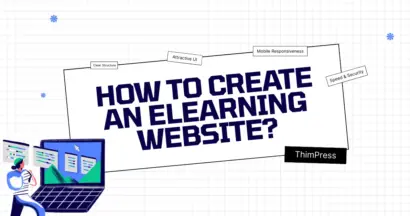Are you ready to elevate your online presence and capture growth? With technology constantly evolving, selecting the right website builder is more critical—and confusing—than ever. Your small business needs a platform that delivers speed, seamless mobile experiences, smart features like AI integration, and top-notch security, all without complexity.
This guide simplifies your decision. We’ve meticulously researched and compared the leading options to identify the best website builder for small business. Focusing on user-friendliness, essential capabilities, and true value, we’ll help you find the perfect match for your unique business goals.
Let’s explore the tools that will empower your digital future and help your business succeed online.
Get ready to explore your online potential and watch your business thrive!
Eduma – Education WordPress Theme
We provide an amazing WordPress theme with fast and responsive designs. Let’s find out!
Most Popular Website Builders For Small Business
Ucraft
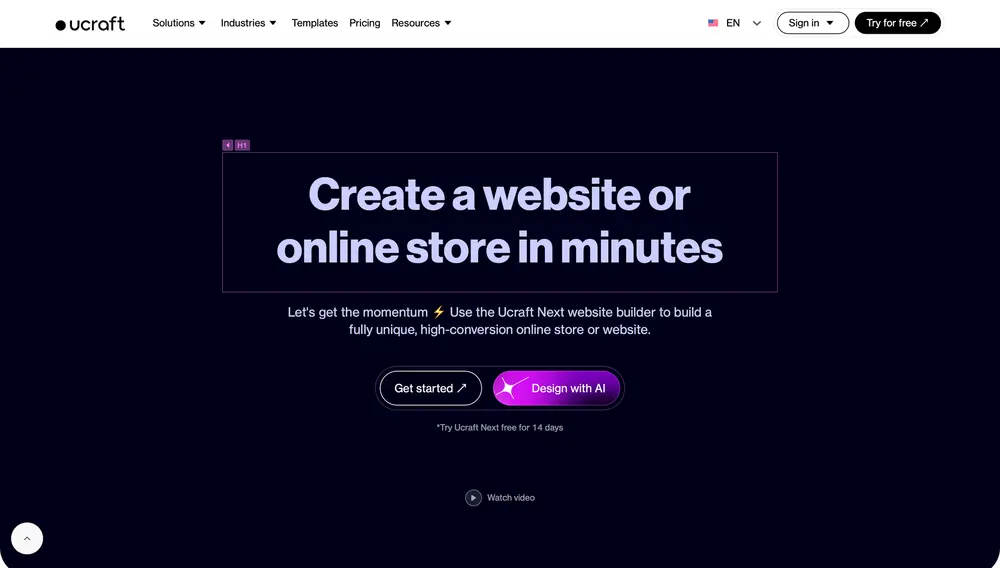
Ucraft Next is a versatile eCommerce and website builder platform that empowers businesses with advanced tools to create and manage their online presence. Featuring Ucraft Next Copilot, an AI-driven builder, it simplifies website creation and customization, making it ideal for businesses looking to scale effectively.
Key Features:
- Comprehensive eCommerce capabilities: Supports selling physical and digital products, subscriptions, bookings, gift cards, and more. The platform is designed to cater to various business models with ease.
- Professional Visual Editor: Offers an Advanced Mode for precise customization, allowing users to create unique, professional-grade websites without needing coding skills.
- App Marketplace: Integrate apps for marketing, analytics, and customer support to enhance functionality and streamline operations.
- Ucraft Next Copilot (AI): Provides AI-driven assistance for layout design and website customization, simplifying the building process and saving valuable time (Coming Soon).
- White Label Website Builder: Ideal for agencies and freelancers who want to offer website services under their own brand. This solution lets businesses maintain full control over their branding while leveraging Ucraft Next’s technology.
Pros:
- Customizable branding: Perfect for agencies looking to scale under their own name.
- Multilingual support: Ideal for businesses targeting diverse markets.
- Cost-effective plans: Offers both free and scalable paid options.
- Scalable for growth: Flexible enough to support small businesses and enterprises as they expand.
- Mobile app availability: A dedicated app for iOS and Android for on-the-go management is also available.
Cons:
- Limited sales channels: Missing direct integrations with marketplaces like Amazon, eBay, or Google Shopping.
- Slight learning curve: Advanced customization features may take time for new users to master.
Best for:
Agencies, freelancers, and small businesses that want a professional, branded, and scalable website-building solution.
Wix
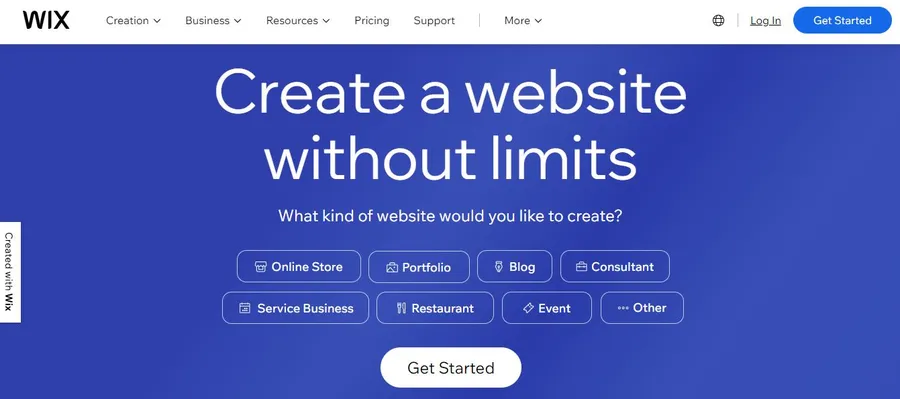
Wix consistently ranks high in the world of website builders, and for good reason. It offers an intuitive drag-and-drop interface, making it incredibly user-friendly, even for those with no coding experience. Its vast template library and extensive App Market provide endless customization possibilities.
Key Features
- Drag-and-drop editor: Effortlessly design your website with Wix’s intuitive interface.
- 500+ templates: Choose from a vast selection of professionally designed templates.
- App Market: Enhance your website’s functionality with hundreds of apps.
- Wix ADI: Let Wix’s Artificial Design Intelligence create a personalized website for you.
- Mobile optimization: Ensure your website looks great on all devices.
Pros:
- User-friendly: Easy to use, even for beginners.
- Extensive features: Offers a wide range of features and customization options.
- Mobile-responsive: Ensures your site looks great on any device.
Cons:
- Can be overwhelming: The sheer number of options can be overwhelming for some.
- Limited SEO control: While Wix has improved its SEO capabilities, it still lacks some advanced features.
Best for: Small businesses seeking a user-friendly platform with extensive features and customization options.
Squarespace
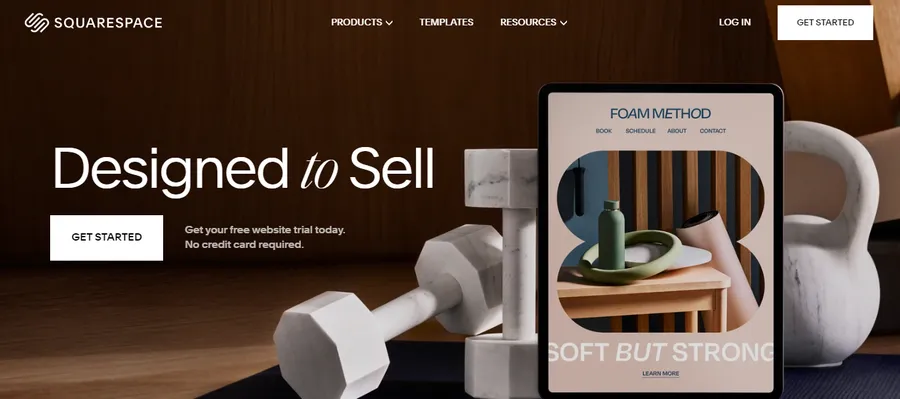
Squarespace is renowned for its sleek, modern templates and its focus on visual appeal. This best website builder for small business is a fantastic choice for businesses that prioritize aesthetics and want a website that looks polished and professional.
Key Features
- Award-winning templates: Choose from a selection of stunning templates designed by professionals.
- Blogging platform: Create and manage a blog seamlessly within Squarespace.
- E-commerce capabilities: Sell products online with Squarespace’s integrated e-commerce features.
- Mobile optimization: Your website will look its best on any device.
Pros:
- Beautiful designs: Squarespace’s templates are visually stunning and modern.
- Easy to use: The interface is clean and intuitive, making it simple to build a website.
- Mobile-responsive: Your site will look great on all devices.
Cons:
- Limited customization: While the templates are beautiful, they offer less flexibility than some other builders.
- Can be pricey: Squarespace’s plans are slightly more expensive than some competitors.
Best for: Small businesses looking for a visually appealing website with a focus on aesthetics.
Shopify

If you’re looking to launch an online store, Shopify is the undisputed champion. It’s a dedicated e-commerce platform with all the tools you need to sell products online, manage inventory, and process payments.
Key Features:
- Powerful e-commerce features: Everything you need to run an online store, including product management, inventory tracking, and secure payment processing.
- App store: Extend Shopify’s functionality with thousands of apps.
- Mobile-first design: Your store will look and function flawlessly on mobile devices.
- Abandoned cart recovery: Recover lost sales with automated email reminders.
Pros:
- E-commerce powerhouse: The go-to platform for online stores.
- Scalable: Shopify can grow with your business.
- Extensive features: Offers a wide range of features and integrations.
Cons:
- Can be expensive: Shopify’s plans and transaction fees can add up.
- Steeper learning curve: While user-friendly, Shopify may take a bit longer to master than some other builders.
Best for: Small businesses that prioritize e-commerce and want a dedicated platform to sell products online.
Weebly
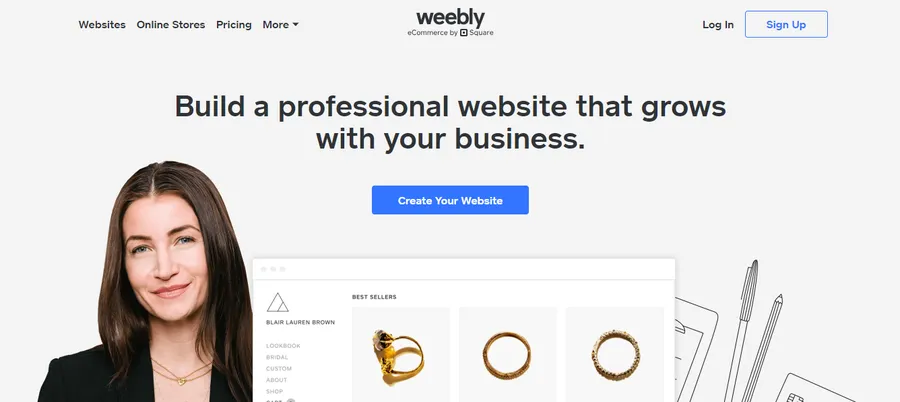
Weebly is another best website builder for small business that is known for its simplicity and affordability, making it an attractive option for small businesses on a budget. It offers a drag-and-drop editor and a decent selection of templates, although its customization options are somewhat limited.
Key Features
- Drag-and-drop editor: Design your website with ease using Weebly’s intuitive interface.
- Mobile-responsive templates: Choose from a selection of templates that look great on all devices.
- App Center: Add functionality to your website with Weebly’s App Center.
- E-commerce capabilities: Sell products online with Weebly’s integrated e-commerce features.
Pros:
- Affordable: Weebly offers a free plan and paid plans are budget-friendly.
- Easy to use: The drag-and-drop editor is simple and intuitive.
- Mobile-responsive: Your site will look great on any device.
Cons:
- Limited customization: Weebly’s templates offer less flexibility than some other builders.
- Fewer features: Compared to some competitors, Weebly has fewer features and integrations.
Best for: Small businesses on a tight budget looking for a simple and affordable website builder.
GoDaddy
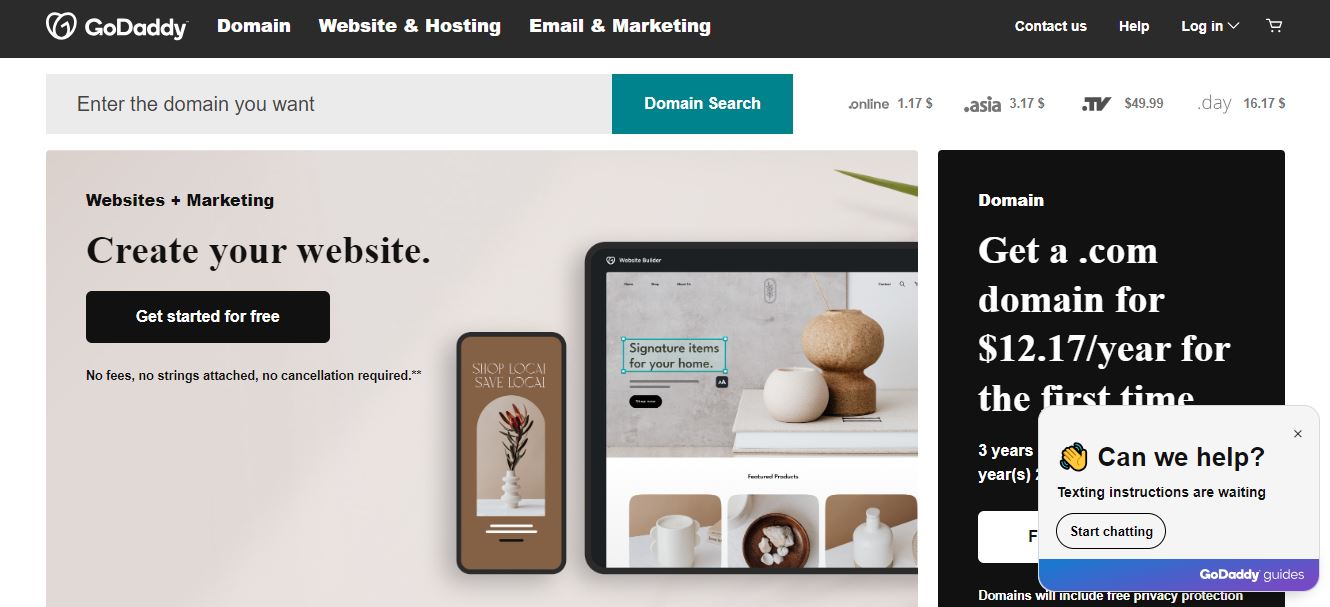
GoDaddy is a well-known domain registrar and web hosting provider that also offers a website builder. Its “Websites + Marketing” platform is designed to be quick and easy to use, with AI-powered tools to help you create a website in minutes.
Key Features:
- AI-powered website builder: GoDaddy’s AI helps you create a website quickly and easily.
- Mobile-friendly designs: Your website will look great on all devices.
- Marketing tools: GoDaddy offers integrated marketing tools to help you promote your business.
- E-commerce capabilities: Sell products online with GoDaddy’s e-commerce features.
Pros:
- Fast and easy: GoDaddy’s AI-powered builder makes it quick to create a website.
- Affordable: GoDaddy offers competitive pricing.
- Integrated marketing tools: Help you promote your business online.
Cons:
- Limited customization: GoDaddy’s templates offer less flexibility than some other builders.
- Fewer features: Compared to some competitors, GoDaddy has fewer features and integrations.
Best for: Small businesses looking for a quick and easy way to create a website with integrated marketing tools.
WordPress.com
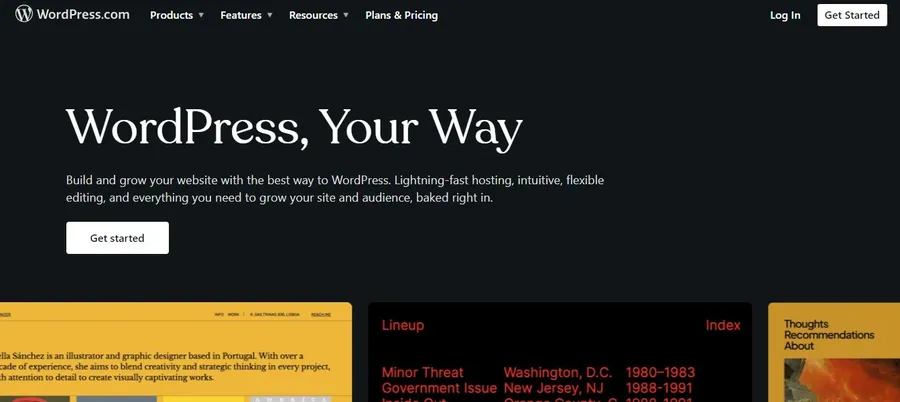
WordPress.com is a hosted version of the popular WordPress.org content management system (CMS). It offers a user-friendly interface and a vast selection of themes and plugins, making it a versatile choice for businesses of all sizes.
Key Features:
- Vast selection of themes: Choose from thousands of free and premium themes.
- Plugin ecosystem: Extend WordPress.com’s functionality with thousands of plugins.
- Blogging platform: WordPress.com is a powerful blogging platform.
- E-commerce capabilities: Sell products online with WooCommerce, a popular WordPress plugin.
Pros:
- Flexible and customizable: WordPress.com offers endless possibilities for customization.
- Scalable: WordPress.com can grow with your business.
- Large community: Access a vast community of users and developers for support and resources.
Cons:
- Steeper learning curve: WordPress.com may take some time to master, especially for beginners.
- Can be complex: Managing themes and plugins can be overwhelming for some.
Best for: Small businesses seeking a flexible and customizable platform with a vast ecosystem of themes and plugins.
Webflow
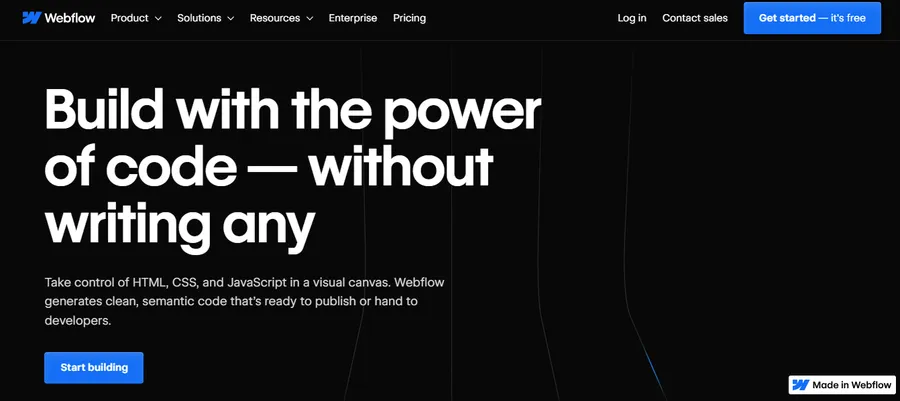
Webflow is a powerful website builder designed for designers and developers. It offers complete control over your website’s design and functionality, making it ideal for businesses that want a truly unique online presence.
Key Features:
- Visual development platform: Design and develop your website visually, without writing code.
- Complete customization: Webflow gives you full control over your website’s design and functionality.
- CMS capabilities: Manage your website’s content with Webflow’s built-in CMS.
- E-commerce capabilities: Sell products online with Webflow’s e-commerce features.
Pros:
- Unmatched flexibility: Webflow offers complete design freedom.
- Powerful features: Ideal for complex websites and web applications.
- Scalable: Webflow can handle websites of any size.
Cons:
- Steep learning curve: Webflow is not for beginners; it requires some technical knowledge.
- Can be expensive: Webflow’s plans are on the higher end.
Best for: Small businesses with design or development experience looking for complete control over their website’s design and functionality.
Choosing the Right Best Website Builder for Small Business
The best website builder for your small business depends on your specific needs and goals. Consider the following factors when making your decision:
- Ease of use: How comfortable are you with technology? If you’re a beginner, choose a platform with an intuitive drag-and-drop editor and good customer support.
- Design flexibility: How important is the look and feel of your website? Choose a platform like Wix or Webflow if you want complete creative control.
- Features: What features do you need? If you’re selling products online, choose an eCommerce platform like Shopify. If you’re creating a blog, choose a platform like WordPress.com.
- Pricing: How much are you willing to spend? Free and affordable options are available, but more advanced platforms can be expensive.
- Customer support: How important is access to help if you need it? Choose a platform with good customer support options, such as live chat or phone support.
Once you’ve considered these factors, take some time to test out a few different platforms to see which one feels right for you. Most website builders offer free trials or free plans, so you can try them out before committing.
Conclusion:
Building a website for your small business doesn’t have to be complicated or expensive. With the right website builder, you can create a professional online presence that helps you attract new customers and grow your business. Take your time, do your research, and choose the platform that best fits your needs and goals.
Read more: What Is a Content Management System (CMS)? 5+ Best CMS platforms
Contact US | ThimPress:
Website: https://thimpress.com/
Fanpage: https://www.facebook.com/ThimPress
YouTube: https://www.youtube.com/c/ThimPressDesign
Twitter (X): https://x.com/thimpress_com

